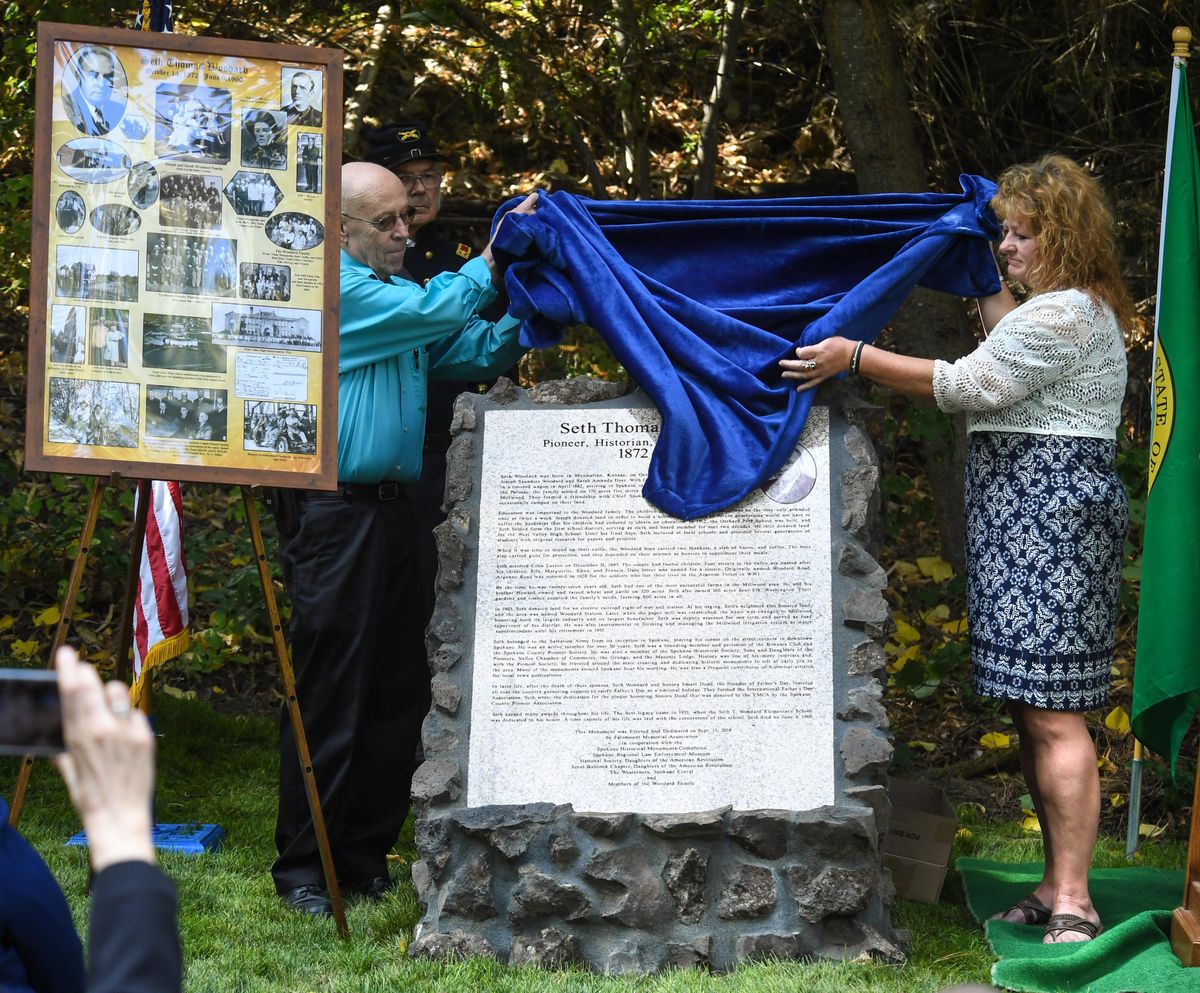Landmarks: Monument dedicated to early Spokane Valley settler Seth Woodard

When her mother, Karen Phillips, died last fall and she was making burial arrangements in the family plot at Greenwood Memorial Terrace, Sheila Brown noticed a memorial monument on the grounds for the first police chief in Spokane.
It occurred to her that her great-grandfather – Spokane Valley pioneer Seth Woodard – was deserving of such an honor and inquired how that might happen. She was put in touch with Rae Anna Victor of the Historical Monuments Committee of the Daughters of the American Revolution, and it came to pass – with Brown providing much of the background information about her great-grandfather, photos and historic documents and Victor helping secure a grant to help pay for the monument – the 26th such historic memorial monument placed on the grounds of Fairmount Memorial Association cemeteries since a group of nonprofit organizations began the practice in 2006.
Dedication of the Seth Thomas Woodard Monument took place Sept. 14 at the Woodward family plot at Greenwood, drawing at least three dozen members of the Woodard family from several states, along with members of the Millwood community, assorted officials and the West Valley High School Jazz Band.
Seth Woodard was a settler of some significance in Spokane Valley, and except for the elementary school named for him in 1953, his name and influence in the development of the Millwood area are not widely recognized – even though he was also a friend of Chief Spokane Garry and active with Sonora Smart Dodd, founder of Father’s Day, in lobbying across the nation to establish Father’s Day as a national holiday.
Seth Woodard was born in Manhattan, Kansas, on Oct. 14, 1872, and in 1882 traveled by covered wagon to the Spokane Valley area with his four siblings and their parents, Joseph and Sarah Woodard. The family purchased 170 acres of homestead grazing land, upon which Chief Garry occasionally camped and struck up a friendship with the family.
The children rode horses to a school at Spokane Bridge and later the Carhope School near the Spokane city limits. Due to the long trek to school, they only attended once or twice a week. Because education was important to the family, Joseph donated some of his land so that a school could be built. Seth Woodard helped form the first school district in the Millwood area and was a board member for many years, later donating some of his land upon which West Valley High School would be built.
By the time he was 27, Woodard was one of the largest farmers in Spokane Valley, raising cattle and wheat on 320 acres. He and his wife, Celia, had 12 children, and several streets in the area were named for some of them — Ella, Marguerite, Edna and Francis. A major north-south street was originally named Woodard Road but renamed Argonne Road in 1920 to honor soldiers who lost their lives in the battle at the Argonne Forest in World War I.
In 1903 Woodard donated land for an electric railroad right-of-way station, which originally was known as Woodward Station. When Inland Empire Paper Mill began operation in 1911 and became a major employer in the area, it was determined the community needed an official name. Millwood was the name chosen – “mill” to recognize the economic driver of the area and “wood” to honor the man recognized as the town’s largest benefactor.
Seth Woodard was an active member of the Salvation Army for 50 years, a founding member and president of the Kiwanis Club and Spokane Pioneer Society. Also a member of the Spokane Historical Society, Sons Daughters of the Pioneers, Spokane Valley Chamber of Commerce, the Grange and the Masonic Lodge, he traveled the state creating and dedicating monuments to help tell the history of early life in the state. He also helped form the Millwood irrigation system and served as its superintendent until he retired in 1955.
Later in life, when both of their spouses had died, he and Sonora Smart Dodd became companions and formed the International Father’s Day Association and drove the effort to have the day recognized as a national holiday.
At the monument dedication ceremony last week, appreciation for the Millwood pioneer was expressed by Millwood Mayor Kevin Freeman, West Valley School District Superintendent Gene Sementi, Seth Woodard Elementary School Principal Mike Lollar and Salvation Army Senior Pastor and Administrator Maj. Ken Perrine. The oldest person in attendance was Dale Woodard, 96, of Post Falls, Idaho, the son of Seth’s brother Harry.
Also at the ceremony, new Veterans Administration markers were unveiled for Seth’s brother Howard and their father Joseph.
Seth Woodard died June 9, 1960, before his great-granddaughter Sheila Brown of Airway Heights was born, but she remembers what her mother told her about him as a family man – most especially that he always stressed the importance of education. He had a list of important rules to live by, as well, she said, which included never giving way to discontentment or misfortune.
Seth Woodard’s grandson Dick Woodard, who came from Anacortes, Washington, to attend the monument dedication ceremony, said he remembered his grandfather from when he was a small boy. “I didn’t appreciate all that he was then. He was just grandpa to me.”